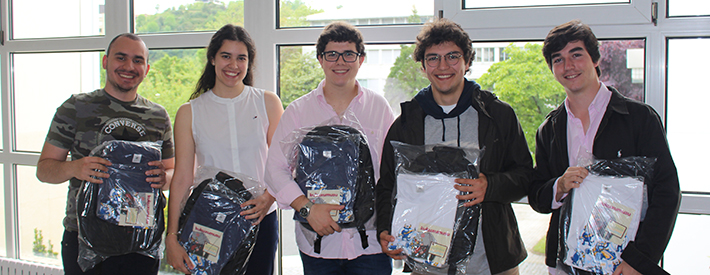News
LATEST NEWS AND EVENTS FROM THE SCHOOL OF ENGINEERING
Learning Economics "pulling our own chestnuts out of the fire".
The students of the subject Economics study the subject with a contest that " financial aid us to learn by ourselves".

Students at subject Economics , taught by Professor Mikel Arcelus, have a novel way of learning. Arcelus launched last year - and has continued this year - the Master's Competition at Economics. "We have given it that name to emulate TV programs such as Master Chef or Master DIY, among others," says the teacher with a smile. It is a group competition among the students in which they are asked questions related to Economics, and they have to answer them by finding the answers on their own. The students have a time limit - one hour and twenty minutes - "to generate a little bit of tension, and they also had penalties if they handed in their answers out of time," Arcelus explains. "Last year it was also done and the winners won dinners at different restaurants in the city. This year, the winners have won a backpack and a Kukuxumusu T-shirt".
The group that won this year is made up of students Manuel Gómez, Samuel Callejo, José Pou, José Salido and María del Vigo. "They won because they scored the most points in the general classification, 287 out of 320," explains Mikel Arcelus, who adds: "It's a different way of learning, the idea is that before giving the subject they have searched a little. And in the following class , depending on how they have answered the questions, the class is given. That is, if we formulate 10 questions and there are 3 of them that the groups have answered well, those topics are not even commented on. We insist more on those questions in which they may have had more doubts", concludes the teacher of Tecnun.
José Pou is one of this year's award winners. He is studying Industrial Engineering at design and says that in the subject of Economics "we have had two parts of group work. In one of them, that of professor Mikel Arcelus, we have done 3 group practices in which he presented us with different questions related to Economics and we had to search the Internet and base ourselves on these search skills to find out the result and thus learn about Economics first hand. In other words, we had to pull our own chestnuts out of the fire. One question that I really liked was the one that asked us to try to explain Economics to the kids, because it wasn't just about looking on the Internet, it was also about using our wits".
For her part, another of the award winners, María del Vigo, thinks it is a very good initiative "because we financial aid learn by ourselves, having to be the ones who look for the information. We research first, and in the following classes the subject is explained. It seems to me a very good method to motivate us in the subject. Thanks to this I have discovered that I really like the world of Economics. I had never taught this subject at school, but I see that in the end the world moves thanks to Economics, so discovering how it works seems very interesting to me".
